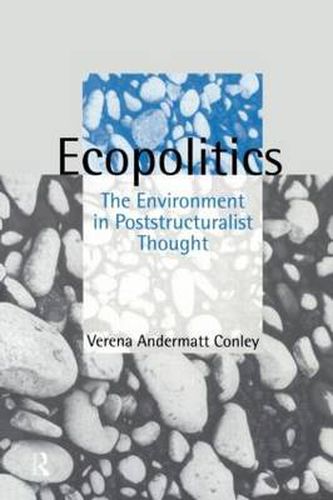Readings Newsletter
Become a Readings Member to make your shopping experience even easier.
Sign in or sign up for free!
You’re not far away from qualifying for FREE standard shipping within Australia
You’ve qualified for FREE standard shipping within Australia
The cart is loading…






Rethinking the conditions of life, space and the state of the world figured prominently in the events of 1968, yet little attention is now being paid to ecological themes that arose in this influential period. Ecopolitics reassesses awareness - or non-awareness of ecological issues in the work of key French poststructural thinkers and others affected by these events. Calling into question the status of the ‘subject’, poststructuralism has been driven not only by feminism but by various findings, in both the social and applied sciences, that bear a strong ecological consciousness. Poststructuralism has continued to open new ways of thinking about the world and of studying concrete conditions of life. Its long-range effects are made possible by an environmental awareness that remains today at the heart of issues concerning cultural theory. Pointing first to some currently disparaging critiques of ecology in the work of Luc Ferry and Jean Baudrillard, Ecopolitics then returns to Claude Levis-Strauss’ critical reading of Satre, which led the way towards ecological thinking in contemporary. Through a reading of key texts by Bateson Serres, Prigogine and Stergers, Virillo, Guattari, Cixous, Irigaray and others, Ecopolitics illustrates how by means of reassuring nature and questioning technologies, a shift away from humanism has played a key role in shaping of ecological thought. Ecopolitics will appeal to students concerned with the environment and those engages in gender and cultural studies.
$9.00 standard shipping within Australia
FREE standard shipping within Australia for orders over $100.00
Express & International shipping calculated at checkout
Stock availability can be subject to change without notice. We recommend calling the shop or contacting our online team to check availability of low stock items. Please see our Shopping Online page for more details.
Rethinking the conditions of life, space and the state of the world figured prominently in the events of 1968, yet little attention is now being paid to ecological themes that arose in this influential period. Ecopolitics reassesses awareness - or non-awareness of ecological issues in the work of key French poststructural thinkers and others affected by these events. Calling into question the status of the ‘subject’, poststructuralism has been driven not only by feminism but by various findings, in both the social and applied sciences, that bear a strong ecological consciousness. Poststructuralism has continued to open new ways of thinking about the world and of studying concrete conditions of life. Its long-range effects are made possible by an environmental awareness that remains today at the heart of issues concerning cultural theory. Pointing first to some currently disparaging critiques of ecology in the work of Luc Ferry and Jean Baudrillard, Ecopolitics then returns to Claude Levis-Strauss’ critical reading of Satre, which led the way towards ecological thinking in contemporary. Through a reading of key texts by Bateson Serres, Prigogine and Stergers, Virillo, Guattari, Cixous, Irigaray and others, Ecopolitics illustrates how by means of reassuring nature and questioning technologies, a shift away from humanism has played a key role in shaping of ecological thought. Ecopolitics will appeal to students concerned with the environment and those engages in gender and cultural studies.